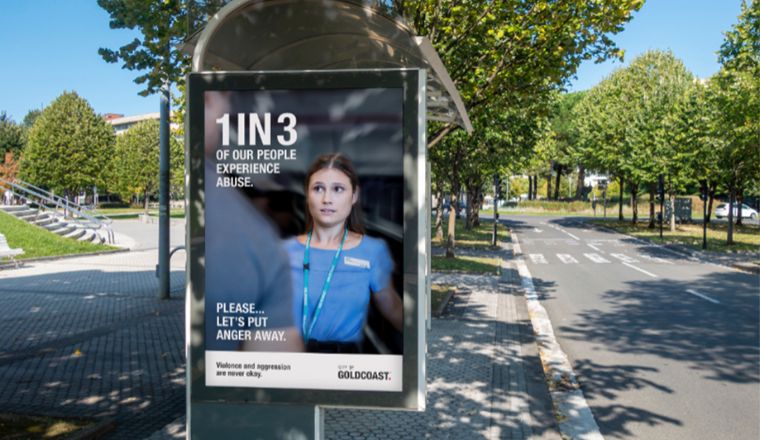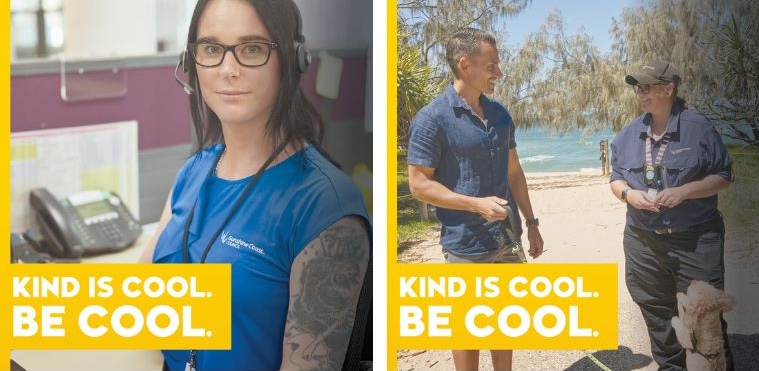
Tim Cox / LGAQ Communications Advisor
It sometimes feels like one of the many things not to emerge unscathed from the COVID-19 pandemic is what my dad, who’s recently turned 80, taught us was ‘common courtesy’.
It’s an unfortunate trend that’s been on the march for a while. In fact, as long ago as 2017, the Shop, Distributive and Allied Employees Association (SDA) launched its ‘No one deserves a serve’ campaign after its research found over 85 per cent of retail and fast-food workers had been abused by customers.
Post-pandemic it’s… an epidemic. Rising prices, supply and logistics issues, staff shortages and other intangibles have led to unprecedented levels of harassment of customer service staff everywhere—and now, unsurprisingly, further shortages of people willing to work in these roles.
You’ve seen the signs. In shops, cinemas, cafes and other places where people congregate and, in particular, on public transport and airports. Signs reminding us that ‘a little kindness goes a long way’, ‘please treat our team with respect’ and urging us to treat people with whom we are transacting with, well, common courtesy.
Queensland’s 77 councils employ some 39,000 people across almost 300 different roles, all of which are vital to enhancing the functionality, wellbeing and liveablility of our communities.
However, the nature of their work sometimes exposes council employees to the risk of encountering hostile situations. Recognising the importance of the safety and security of their staff, councils have implemented various measures to protect employees from potential abuse or attacks by members of the public.
One of the primary strategies employed by councils is the implementation of comprehensive training and education programs for their employees. These programs focus on equipping staff with the necessary skills to assess and manage potentially volatile situations. Training may include conflict resolution, de-escalation techniques, and communication skills to effectively handle challenging interactions with the public.
Brisbane City Council has established a robust training program that covers various aspects of personal safety. This includes workshops on identifying potential risks, understanding body language, and responding appropriately to aggressive behaviour. By investing in these programs, councils aim to empower their employees with the tools and knowledge needed to navigate potentially dangerous situations with confidence and composure.
While instances of violence and other antisocial behaviour—including groups of teens stealing, threatening other children and intimidating staff—prompted Cairns Regional Council to beef up security at four of its libraries early last year, hiring guards on an ongoing basis at the City, Earlville, Manunda and Smithfield branches.
Many councils have prioritised the implementation of physical security measures, such as Perspex screens, initially to keep workers safe from COVID but now to create a more secure working environment and includes the widespread installation of surveillance camera networks, panic buttons, and security alarms in high -risk areas.
At Gympie Regional Council, staff are taking a more subtle approach to—hopefully—preventing abuse and aggression towards workers by emphasising love, generosity and compassion through initiatives that foster connection within the community.
Through the recent ‘Connect at Christmas’ campaign, Council provided residents with a comprehensive package of resources, events and information—from themed invitations and corflutes to help residents host their own street parties, inspiring random acts of kindness through electronic signage and encouraging locals to donate to charity gift drives—to help foster meaningful connections and combat the loneliness many Australians experience during the festive season.
Gympie Mayor Glen Hartwig said the campaign embodied the spirit of unity and compassion, which the Gympie region is renowned for.
“Through ‘Connect at Christmas’, council aimed to strengthen bonds and ensure that all residents feel the warmth and support of the community,” Cr Hartwig said.
Likewise, Gympie’s ‘Summer Safety’ campaign aims to engage and encourage the community to prepare themselves, their family, their homes and care for wildlife, without using the word ‘disaster’—highlighting that safety is a shared community responsibility.
Sunshine Coast Council is also working to create a culture of kindness beyond its own walls and into the local community with the development of its ‘Kind is Cool’ campaign, which features a comprehensive toolkit of resources—videos, social media assets and printable posters— businesses can use to encourage better treatment of their staff.
The campaign, which was developed off the back of COVID to support businesses experiencing rudeness and aggression from customers, features local businesspeople as the face of the campaign as well as a council staff member, with resources created specifically for health, hospitality, retail, transport and council, in addition to general use.

City of Gold Coast research found that 42 per cent of its frontline staff have experienced occupational violence and aggression (OVA) from the public and it is having a negative impact on their health and wellbeing. Parking, library and customer contact staff are most frequently in the ‘firing line’ for aggression provoked by matters such as council service changes (i.e. new paid parking zones), general activities (i.e. rates notices) and during holiday periods.
These matters are, of course, run of the mill at every council in the country. While the most common form of OVA is verbal abuse, the impact on City of Gold Coast Council’s workforce is considerable; 65 per cent of workers—61 per cent among indoor workers and a staggering 72 per cent among their outdoor-based colleagues—are concerned about aggressive behaviour from the public.
Council is currently refreshing its empathy-based campaign designed to encourage strategic behaviour change from key aggressors by showcasing staff as everyday people just doing their jobs and highlighting the OVA behaviour and its consequences. By way of demonstrating the extent and depth of thinking behind the initial campaign, Council ensured staff safety by using paid actors for the campaign, whilst still delivering authentic-looking content.
With a tagline of ‘Please… let’s put anger away. Violence and aggression are never okay.’, the campaign focussed on people in the region interacting with selected Council services and males aged 25-55 years, living in geographically targeted areas, and utilised non-traditional channels such as YouTube, Foxtel Go, Kayo, outdoor, social media and radio spots.
Reaching more than half-a-million people in just six weeks, the initial campaign saw the number of reported occupational violence and aggression incidents almost halved. That’s Council staff reporting being abused almost 50 per cent less.
The refreshed campaign’s use of workers in indoor and outdoor roles is broader than the original iteration’s three specific roles. Council has also added some new (offender) personas, reflecting feedback from staff—particularly regarding the inclusion of women.
Council describes the approach as recognising it is unlikely to shift the behaviour of serious offenders or those with other factors including mental health issues. Instead, it is aiming to talk to and resonate with ‘reasonable people who are sometimes unreasonable’.
By taking a proactive stance on employee safety, councils aim to mitigate potential risks and ensure that their staff can carry out their duties with confidence and peace of mind. As the landscape of public service evolves, ongoing efforts to adapt and enhance protective measures will remain essential to safeguarding the wellbeing of council employees across Queensland.
So, will courtesy ever become common again? Not any time soon, it appears. Sociology professor Michael Halpin told Canadian broadcaster CTV News that society went through ‘the worst event of this lifetime’. He says people view the pre- and post-pandemic time periods with ‘stark division’ and were expected to go back to normal once lockdowns ceased.
Professor Halpin believes the pandemic exacerbated deep-seated issues such as mental health, homelessness and access to healthcare, and has led people to think differently about one another. This, he says, can manifest itself as impatient customers and clients, less-friendly public interactions and selfish behaviour.
“I have this idea of pre-COVID as being more tranquil than it actually was, but it was also a mess,” he said.
“In some ways, COVID may have been the gasoline, but I think for a lot of the problems that we have, it wasn’t necessarily the fire.”